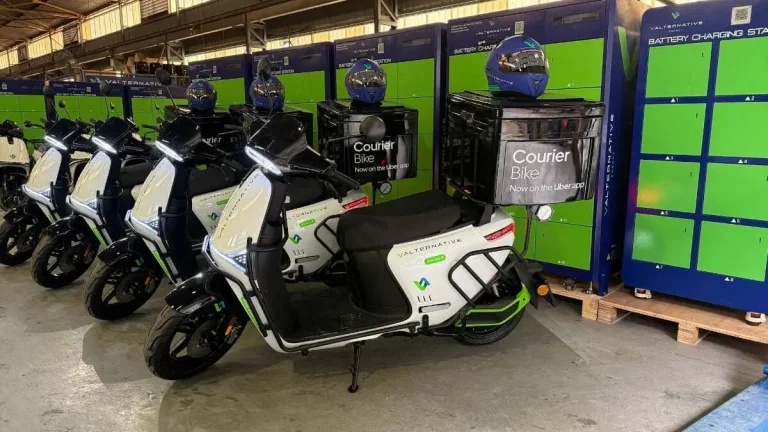South Africa’s delivery industry is undergoing a quiet revolution, with electric motorcycles rapidly becoming a popular alternative to petrol-powered vehicles. In less than two years, e-mobility company Valternative Energy has deployed over 1,000 electric delivery bikes and 100 battery-swapping stations nationwide a major milestone in the country’s shift toward cleaner urban transport.
Thank you for reading this post, don't forget to subscribe!Valternative made headlines in early 2023 when Uber partnered with the company to power its Package courier service with electric bikes. The service launched in December 2023 in Cape Town after initial import delays, including a 45-day holdup at Durban harbour.
Since then, the e-bikes have been embraced by major on-demand delivery services and restaurant chains, supporting hundreds of jobs in the process. Famous Brands the parent company of Debonairs, Mugg & Bean, Steers, and Wimpy is one of Valternative’s key partners.
Electric Bike Models and Performance
Valternative’s first models, the V1 and V1 Max, offered ranges of 90km and 110km respectively, with top speeds of up to 95km/h. The company has since introduced the V1 Pro Max, with improved performance up to 4.5kW output, a 100km range, and a top speed of 80km/h.
All models feature swappable battery packs, allowing riders to quickly exchange depleted batteries for fully charged ones, rather than waiting to recharge.
How Battery Swapping Works
Unlike most electric vehicles with fixed batteries, Valternative’s system uses locker-style swap stations, each with at least eight charging compartments.
- A rider unlocks a locker using an app or facial recognition.
- The used battery is placed in an empty slot.
- A fully charged battery is released for immediate use.
The entire process takes less than a minute, helping drivers spend more time on the road and less time waiting.
Battery Swap Stations Deployed At:
- Engen
- Shell
- Sasol
- Properties owned by Atterbury, Broll, Redefine, and Trafalgar
By May 2025, Valternative’s network had completed over 300,000 swaps, averaging around 2,000 per day.
Cost Efficiency and Environmental Benefits
Valternative’s CEO, Mahomed IE Jeewa, revealed that their fleet covered 24 million kilometres in 18 months, powered by 1.2 million kWh of electricity.
- Energy efficiency: 20km per kWh
- Cost: ~R0.20 per kilometre (vs R0.65 for a 125cc petrol bike)
The bikes are not only more cost-efficient but also reduce noise and carbon emissions, contributing to cleaner cities.
Growing National Footprint
After its Cape Town launch, Valternative expanded to Gauteng and Durban, setting up training centres and warehouses in each hub. With real-time monitoring through a digital dashboard and CCTV-secured stations, the company ensures operational reliability and security.
Valternative by the Numbers:
- 1,000+ e-bikes deployed
- 100 swap stations
- 300,000 battery swaps completed
- 24 million km covered
- 44,000 km travelled per day
- 25% of stations already powered by solar
Looking Ahead: More Bikes, More Power
Valternative plans to expand its fleet and charging network, aiming to increase total distance travelled fivefold within the next 18 months. The company is also targeting 70% clean energy usage, with more solar-powered charging stations planned.
Another major development is the planned launch of a four-wheel electric delivery vehicle, showcased at the Smarter Mobility Africa 2025 conference. This would place Valternative in direct competition with local solutions like the Mellowvan, already used by Takealot, DHL, and Spar2U.
A New Era for Urban Delivery
The rise of electric delivery bikes is more than a trend it’s a transformation of South Africa’s logistics and delivery landscape. As more businesses embrace sustainable and cost-efficient solutions, e-bikes could soon become the standard for urban last-mile delivery.
Valternative’s rapid growth demonstrates how technology, innovation, and strategic partnerships can accelerate the shift toward a greener, smarter mobility future.
Related article: The Future of Electric Cars: Driving Toward a Greener South Africa




